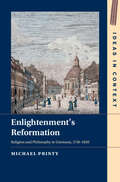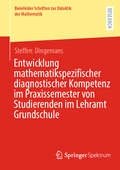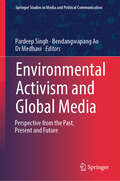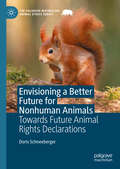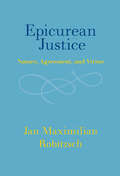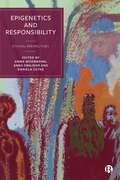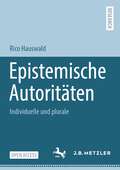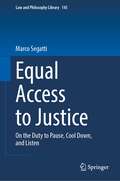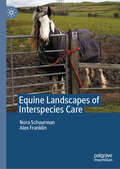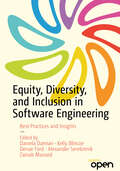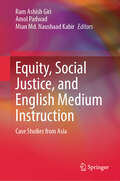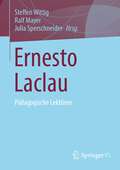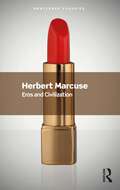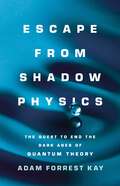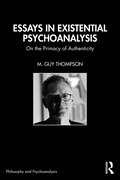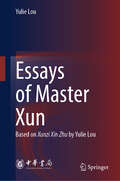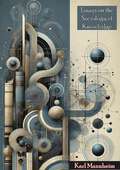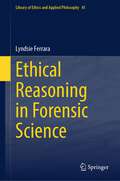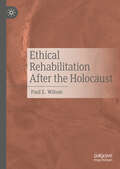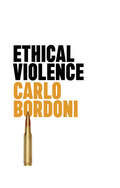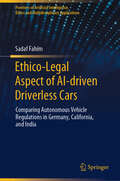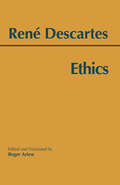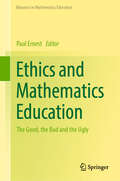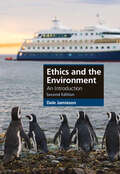- Table View
- List View
Enlightenment's Reformation: Religion and Philosophy in Germany, 1750–1830 (Ideas in Context)
by Michael PrintyHow did we get from the religious core of the sixteenth-century Reformation to the notions of freedom popularised by Hegel and Ranke? Enlightenment's Reformation explores how two key cultural and intellectual achievements – the sixteenth-century Reformation and the late eighteenth-century birth of 'German' philosophy – became fused in public discussion over the course of the 'long' eighteenth century. Michael Printy argues that Protestant theologians and intellectuals recast the meaning of Protestantism as part of a wide-ranging cultural apology aimed at the twin threats of unbelief and deism on the one hand, and against Pietism and a nascent evangelical awakening on the other. The reimagining of the Reformation into a narrative of progress was powerful, becoming part of mainstream German intellectual culture in the early decades of the nineteenth century. Utilising Reformation history, Enlightenment history, and German philosophy, this book explores how the rich if unstable idea linking Protestantism and modern freedom came to dominate German intellectual culture until the First World War.
Entwicklung mathematikspezifischer diagnostischer Kompetenz im Praxissemester von Studierenden im Lehramt Grundschule (Bielefelder Schriften zur Didaktik der Mathematik #17)
by Steffen DingemansDie Qualität eines Unterrichts, der sich an den individuellen Voraussetzungen der Schulkinder orientiert, hängt maßgeblich mit der diagnostischen Kompetenz der Lehrkraft zusammen. Folglich ist die Entwicklung dieser eine grundlegende Aufgabe aller drei Phasen der Lehrkräftebildung. In der vorliegenden Studie wird das Praxissemester als struktureller Bestandteil der ersten Phase der Lehramtsausbildung fokussiert und die Wirkung auf die Entwicklung mathematikspezifischer diagnostischer Kompetenz untersucht. Den Kern der als mixed-method angelegten längsschnittlichen Evaluation stellen vier Videovignetten dar, zu denen die Studierenden aus dem Grundschullehramt in einer Online-Umfrage mit offenen Antwortformaten aufgefordert wurden, die Lösungswege von Kindern zur Addition und Subtraktion fachlich angemessen zu analysieren. Die Ergebnisse bestätigen einerseits die geringe Effektivität vor allem der schulischen Praxisphase. Anderseits werden auf Basis der vorliegenden Daten relevante Bedingungsfaktoren herausgearbeitet und Verbesserungsmöglichkeiten für die universitäre und schulische Phase des Praxissemesters diskutiert.
Environmental Activism and Global Media: Perspective from the Past, Present and Future (Springer Studies in Media and Political Communication)
by Pardeep Singh Bendangwapang Ao Dr MedhaviThis scholarly work discusses the historical, contemporary, and prospective dimensions of environmental activism and its intersection with global media. It provides a comprehensive view of the pivotal role played by the media in shaping awareness concerning environmental challenges and catalyzing actions to address them. Drawing upon the insights of an interdisciplinary cohort of scholars, the book systematically examines the diverse aspects of the nexus between media and environmental activism. Chapter contributions establish the foundational framework for comprehending how media as a whole lend support to activism; delineate the historical trajectory of environmental activism; the construction of narratives within the political, economic, and social domains of society; scrutinize the function of mass media within the context of globalization, digitization, and social media; and elucidate how governance structures influence the environmental activism process. By introducing readers to the basic narrative in environmental activism, globalization, and media, this book will be an important source of information for researchers, academicians and students engaged in various interdisciplinary studies linked to media, environment and activism.
Envisioning a Better Future for Nonhuman Animals: Towards Future Animal Rights Declarations (The Palgrave Macmillan Animal Ethics Series)
by Doris SchneebergerThis book presents an ethical discussion of the possible future Universal Declarations of (diverse specific nonhuman) Animal Rights. It contributes to a basis for a discussion about (nonhuman) animal rights concerning diverse aspects and quality of (nonhuman) animal life. Doris Schneeberger deals with the interpretation and justification of animal rights, and argues that because (nonhuman) animals are individuals whose lives are intrinsically and inherently valuable, their goods and welfare ought to be protected. She claims that these rights should be protected in possible morally advanced societies of the future.
Epicurean Justice: Nature, Agreement, and Virtue
by Jan Maximilian RobitzschThe ancient Greek philosopher Epicurus and his followers advanced a sophisticated theory of justice that occupied a middle position between Plato and Aristotle, on the one hand, and some Sophists, on the other. They held that justice is neither fully natural nor fully conventional, that there is a robust virtue of justice, and that it is always better to be just than to be unjust, but it is not always better to obey the laws. In this book, the first English-language monograph on the topic, Jan Maximilian Robitzsch draws on a range of sources including papyrological evidence to give a comprehensive account of Epicurean justice. He shows how it relates to Epicurean philosophy as a whole and discusses to what extent it can be seen to anticipate modern positions such as contractarianism and legal positivism.
Epigenetics and Responsibility: Ethical Perspectives
by Emma Moormann, Anna Smajdor and Daniela CutasEPUB and EPDF available Open Access under CC-BY-NC-ND licence. We tend to hold people responsible for their choices, but not for what they can’t control: their nature, genes or biological makeup. This thought-provoking collection redefines the boundaries of moral responsibility. It shows how epigenetics reveals connections between our genetic make-up and our environment. The essays challenge established notions of human nature and the nature/nurture divide and suggest a shift in focus from individual to collective responsibility. Uncovering the links between our genetic makeup, environment and experiences, this is an important contribution to ongoing debates on ethics, genetics and responsibility.
Epistemische Autoritäten: Individuelle und plurale
by Rico HauswaldDas primäre Ziel dieses Open-Access-Buches besteht in der Entwicklung einer Theorie pluraler epistemischer Autoritäten. Epistemische Autoritäten spielen in unserer durch Spezialisierung geprägten und hochgradig arbeitsteilig organisierten modernen „Informations-“ oder „Wissensgesellschaft“ eine zentrale Rolle. Die Philosophie hat diesem Umstand in den letzten Jahren durch eine zunehmend intensive Diskussion Rechnung getragen. Ein entscheidendes Defizit dieser Debatte besteht nach Diagnose des Autors allerdings darin, dass sie sich fast ausschließlich auf individuelle epistemische Autoritäten konzentriert hat. In unserer epistemischen Praxis sind plurale epistemische Autoritäten – d.h. wissenschaftliche Gemeinschaften, Expertengremien, Geschworenenjurys usw. – aber mindestens genauso bedeutsam. Wir berufen uns auf „wissenschaftlichen Konsens“, orientieren uns an „herrschenden Meinungen“ usw. und stützen uns damit auf plurale epistemische Autoritäten. Das Buch möchte die Potentiale, aber auch die Herausforderungen und Fallstricke analysieren, die diese Praxis des Sich-Stützens auf plurale epistemische Autoritäten mit sich bringt.
Equal Access to Justice: On the Duty to Pause, Cool Down, and Listen (Law and Philosophy Library #145)
by Marco SegattiIt is wrong when someone cannot exercise their rights in a court of law because they have no money to pay for a good lawyer, because they are too scared of the possible consequences, or because they simply don’t know that the law protects them. But does that mean governments have an obligation to intervene? And if so, how?This book provides the first systematic philosophical theory of equal access to justice. It begins by identifying the content of claims to equal access to justice. Then, it reviews traditional political and legal arguments on the right of access to justice, which it argues are both illuminating and insufficient. The best comparative way to approach equal access to justice, the book argues, is to think through the requirements of a moral, pre-political, duty to – at times and provisionally – pause, cool down and listen: in other words, we ought to demand that governments step in and protect access rights, because we have a moral and pre-political interest in cultivating our ability to comply with this duty. It is the recognition of this duty which best explains both law’s potential for promoting, as well as its potential for endangering, equal justice. In closing, the book tests this novel theory of equal access to justice against contemporary trends and reforms in procedural law.
Equine Landscapes of Interspecies Care
by Nora Schuurman Alex FranklinThis book focuses on the spaces and practices of caring for horses, explored in a series of case studies set across the equine lifespan. For horses, everyday practices of care as well as ever-changing understandings of what is good care directly shape their living conditions and lives with humans. In this book, questions of animal ethics and welfare are approached in a tangible way by exploring the relationships and practices of interspecies care across a range of different spaces, including horse yards, training grounds, farms, rescue centres and the street. The chapters illuminate the ways in which interspecies care ties horses to human society and culture, addressing care practices in different stages of the equine life cycle. Through a unique set of case-studies addressing issues such as training, working, rescue, aging and death, the book offers a clear overview of how humans shape the lifespan of animals living under their care. It simultaneously foregrounds the agency of animals in this process and how such agency is interpreted and responded to by humans. With its theoretically solid analysis of rigorous empirical study, the book answers the need to understand human connection to the nonhuman world within the everyday practices and spaces of contemporary society and culture.
Equity, Diversity, and Inclusion in Software Engineering: Best Practices and Insights
by Alexander Serebrenik Daniela Damian Kelly Blincoe Denae Ford Zainab MasoodCreating an inclusive environment where different software developers can feel welcome and leverage their talents is an ethical imperative no company can ignore. Indeed, software organizations have in the last decade been trying to make changes for a more diverse and inclusive software development environment. The push for increased diversity in software has been a public one, from annual diversity reports by some of the worlds’ most visible companies such as Microsoft, Google, and Facebook, to large projects such as Linux Foundation’s Software Developer Diversity and Inclusion project that explores, evaluates, and promotes best practices from research and industry to increase diversity and inclusion in software engineering. Despite these many efforts, diversity remains low. Numbers from the software industry show that less than 25% of software engineers are women. Diversity is also low in regards to many other facets of diversity. This book provides an overview of research into the different aspects of diversity and inclusion in software engineering, as well as the tools, methods, and practices proposed to foster diversity and to build inclusive software teams and development environments. It describes research challenges in studying diversity and inclusion in software. Readers will be challenged to consider how they are contributing to a lack of inclusion and what they can do to improve inclusion in the software industry.What You Will Learn Aspects of diversity (e.g., age, culture, gender, race) and relationship to software engineering activities and outcomesHow to measure diversity Investigations of intersectionality in software engineering Research methods for the study of diversity and inclusion in software engineering Empirical studies of effective practices to foster diversity and inclusion in software engineering Interventions and programs that have been used to successfully support retention in software engineering Software engineering education for diverse and inclusive software engineering, and proven teaching methods/environments that support diverse and inclusive software engineering Who This Book Is For For Researchers, the book presents a state-of-the-art collection of existing studies into many aspects of diversity, methods, and tools proposed and tried out in practice, challenges in research, and contributing to a research agenda on this topic for future studies. For Industry practitioners, the book describes efforts to investigate diversity in software teams, whether in corporate or open source environments. It also describes empirical evidence about effectiveness of certain methods and approaches to foster diversity and inclusion in software development. For Educators,the book describes practices and effective changes in Computer Science/Software Engineering curricula that were found as effective in engaging learners from minoritized groups, creating inclusive software teams that are diverse, and which relate to educational material useful for training for diversity, equity, and inclusion.
Equity, Social Justice, and English Medium Instruction: Case Studies from Asia
by Ram Ashish Giri Mian Md. Naushaad Kabir Amol PadwadThis book contributes to the existing body of knowledge on English Medium Instruction's (EMI) role in equity and social justice and adds to the ongoing conversation by providing the Asian perspective to it. It showcases scholarly works by scholars and researchers in the field and presents their diverse voices on EMI and social justice in a single volume. This book focuses on different aspects of the issue on EMI, equity, and social justice in different Asian contexts while providing a holistic picture of social justice in English language teaching in the region. It focuses on the current context-specific EMI practices situating them in their historical pretext, employs prevalent theoretical as well as methodological models and approaches to study such practices, considers curricular and pedagogical considerations adapted to address the multitude of needs of EMI, and examines controversies surrounding the conceptualization, plan/policy, and implementation strategies of EMI.
Ernesto Laclau: Pädagogische Lektüren
by Ralf Mayer Steffen Wittig Julia SperschneiderDer Band diskutiert ausgewählte Positionen der Theoriebildung Ernesto Laclaus, die in den letzten Jahren im Kontext demokratietheoretischer Debatten zwar in politik-, kultur- und sozialwissenschaftlichen Feldern rezipiert wurde, deren Aufnahme in erziehungswissenschaftlichen Debatten aber eher als ‚handverlesen‘ bezeichnet werden könnte. Die Rezeption beschränkt sich häufig auf spezifische Einsätze rund um die gemeinsam mit Chantal Mouffe in Hegemonie und radikale Demokratie entwickelte und an Antonio Gramsci ansetzende Hegemonietheorie. Dass Laclaus Perspektiven jedoch eine Vielzahl produktiver Anschlüsse und Irritationen für unterschiedliche pädagogische Frage- und Problemstellungen beinhalten, verdeutlichen die hier versammelten Beiträge rund um transdisziplinäre Spannungsverhältnisse von Politik, Bildung und Pädagogik, von Artikulation und Repräsentation, von Ontologie und Identität oder im Kontext aktueller Sichtweisen auf Inklusion, Solidarität, Migration, pädagogische Beziehungen und Professionalität.
Eros and Civilization: A Philosophical Inquiry Into Freud (Routledge Classics)
by Herbert MarcuseHailed as the 'Guru of the New Left' and a leading figure of 1960s counterculture and liberation movements, the philosopher Herbert Marcuse is amongst the most renowned and controversial thinkers of the twentieth century. Eros and Civilization is one of his best-known books and brought him international fame. Taking his cue from Freud's view that repression of the instincts is a defining characteristic of the human mind, Marcuse fuses Freud's insight with Marx's theories of alienation and oppression. He argues that rather than our instincts turned in on themselves, it is modern capitalism itself that is preventing us from reaching the freedom we can find in a non-repressive society. A sweeping indictment of modern capitalism and consumerism that remains fresh and insightful, Eros and Civilization is a classic of activist and radical thinking that continues to fire debate and controversy today. This Routledge Classics edition includes a new Foreword by Douglas Kellner.
Escape from Shadow Physics: The Quest to End the Dark Ages of Quantum Theory
by Adam Forrest KayThis "artfully written...splendid history of classical and quantum physics" (Science) that "rightfully highlights the limitations of current physics" (Wall Street Journal) and argues for a revolutionary new understanding of quantum mechanics The received wisdom in quantum physics is that, at the deepest levels of reality, there are no actual causes for atomic events. This idea led to the outlandish belief that quantum objects—indeed, reality itself—aren&’t real unless shaped by human measurement. Einstein mocked this idea, asking whether his bed spread out across his room unless he looked at it. And yet it remains one of the most influential ideas in science and our culture. In Escape from Shadow Physics, Adam Forrest Kay takes up Einstein&’s torch: reality isn&’t mysterious or dependent on human measurement, but predictable and independent of us. At the heart of his argument is groundbreaking research with little drops of oil. These droplets behave as particles do in the long-overlooked quantum theory of pilot waves; crucially, they showcase quantum behavior while being described by classical physics. And that classical-quantum interface points to a true understanding of quantum mechanics and a reasonable universe. A bold and essential reset of the field, Escape from Shadow Physics describes the kind of true scientific revolution that comes along just once—or less—in a century.
Essays in Existential Psychoanalysis: On the Primacy of Authenticity (Philosophy and Psychoanalysis)
by M. Guy ThompsonIn this brilliant and revolutionary collection of 14 major essays that draw from more than 25 years of painstaking research, M. Guy Thompson regales us with a stunning revisioning of conventional psychoanalysis that deepens our understanding of the human condition. Integrating the most seminal existentialist philosophers, including Nietzsche, Heidegger, and Sartre, with the most forward-thinking psychoanalysts over the past century, including Freud, Laing, Bion, Winnicott, and Lacan, Thompson offers a profound yet deeply personal vision of what psychoanalysis can be in the 21st century. In this fascinating volume, Thompson explores such concepts as experience, authenticity, will, happiness, and agency by utilizing a wide range of thinkers, including the ancient Greeks, but always in his singular voice. Exquisitely lucid and engaging to read, Thompson deftly lures us into thoughtful and enlightening territory typically inaccessible to the general reader. This compelling integration of continental philosophy and psychoanalysis will be of interest not only to psychoanalytic practitioners of all persuasions, but to psychotherapists generally and their patients, as well as philosophers, social scientists, and any student of the human condition.
Essays of Master Xun: Based on Xunzi Xin Zhu by Yulie Lou
by Yulie LouThis is the first book written by Chinese scholars with more accurate interpretation of Master Xun’s philosophy and quoted texts from other Chinese classics. Master Xun is one of the greatest Confucian philosophers of the classical period in China. His thought has been exercising a profound impact on ideology, academic research, social and political system, ritual and moral principles, as well as the practical aspects of personal self-cultivation, education and learning. After reading the book, the readers will understand thoroughly the ancient Chinese philosophy.
Essays on the Sociology of Knowledge
by Karl MannheimEssays on the Sociology of Knowledge by Karl Mannheim is a foundational work in the field of sociology, offering profound insights into how human thought, knowledge, and ideology are shaped by social contexts. Originally published in the early 20th century, Mannheim’s essays explore the relationship between knowledge and society, challenging the notion that ideas exist independently of the social environment in which they arise. His work remains essential for students and scholars interested in the sociology of knowledge, philosophy, and political thought.Mannheim argues that all knowledge is socially conditioned, meaning that individuals and groups produce ideas that reflect their specific social position and historical context. He introduces the concept of ideology and utopia—terms that describe, respectively, the ways dominant groups seek to maintain the status quo through their ideas and how marginalized or revolutionary groups generate transformative visions of the future. This dynamic interaction between knowledge, power, and social structure lies at the heart of Mannheim’s analysis.The essays in this collection address key questions about objectivity, the role of intellectuals, and the limits of scientific knowledge in understanding society. Mannheim examines how worldviews, or Weltanschauungen, differ across classes and social groups, demonstrating that no perspective is neutral. Instead, all forms of thought must be seen as part of broader social processes that influence and constrain them.Essays on the Sociology of Knowledge offers readers a way to critically examine how ideas function within society and how individuals can better understand their own thinking as shaped by historical and cultural forces. Mannheim’s insights have had a lasting impact on sociology, philosophy, and political theory, continuing to inform debates on ideology, power, and the nature of truth. This work remains an essential read for those seeking to understand the interplay between knowledge, society, and power.
Ethical Reasoning in Forensic Science (Library of Ethics and Applied Philosophy #41)
by Lyndsie FerraraThis book explores the impact of ethical reasoning in forensic science and demonstrates that it is in fact a foundational skill required by those engaged in the field. Forensic science is viewed as a mechanism to aid the criminal justice system in finding truth, but failures within the field contribute to the growing injustice facing society. The author recognizes these failings and brings a new perspective by establishing bioethical principles as a foundation for improving ethical reasoning skills. These skills are a critical component of forensic science education for upcoming professionals. While other books focus on egregious cases of ethical misconduct, this text highlights the daily decisions and issues that occur during the forensic investigation and analysis processes. It is written for future forensic professionals and forensic science educators, as well as those individuals already working in the forensic science field.
Ethical Rehabilitation After the Holocaust
by Paul E. WilsonGenocide murders innocents in a society, and it leaves behind moral corruption and societal twistedness. A genocide like the Holocaust can happen only if the normative ethical commitments to honor the fundamental right to life are compromised or abandoned. When a society lives through a genocide, the moral imagination of peoples and collectives, their ethical behaviors, and even the underlying social contract become twisted and broken. Societies and individuals caught within a genocide need an ethical rehabilitation to move a post-genocidal society out of its ethical degradation. This book discusses the steps of transitional justice as ethical ways to move individuals and societies away from lingering injustices and toward an equilibrium of justice.
Ethical Violence
by Carlo BordoniHuman civilization is founded on ethical principles, norms of behaviour that have accumulated over time. Perhaps the oldest of ethical principles is the rejection of violence, which includes the respect for life and for the physical and psychological integrity of others. But, in some circumstances, violence itself can be regarded as ethical – for example, when it is used by states claiming to act in self-defence. In these circumstances, the need to defend oneself against an enemy can transform war from an unacceptable act into a necessary, socially shared and morally sanctioned choice. And it is when violence becomes ethical that we must begin to fear for our future. In the wake of the pandemic, we are witnessing the growing prevalence of aggression and emotionality in social and political life. We find ourselves living in an increasingly impatient and insecure society, which is sceptical of scientific thought and which takes refuge in the irrational. The decline of rationality and the growing prevalence of violence are increasingly common features of a society that has lost touch with the great Enlightenment narrative. We need, argues Bordoni, to rediscover the rationality we have lost and recuperate the positive side of technology.
Ethical and Legal Aspects of Computing: A Professional Perspective from Software Engineering (Undergraduate Topics in Computer Science)
by Gerard O'ReganThis textbook presents an overview of the critically important ethical and legal issues that arise in the computing field and provides a professional perspective from software engineering. The author gained exposure to these aspects of computing while working as a software engineer at Motorola in Ireland, where he coordinated the patent programme and worked with several software suppliers. Topics and features: Presents a broad overview of ethics and the lawIncludes key learning topics, summaries, and review questions in each chapter, together with a useful glossaryDiscusses the professional responsibility of computer professionalsExplores ethics in various civilisations and religious traditionsDiscusses ethical software engineering and ethical outsourcingConsiders what is fair and ethical in data scienceDescribes ethical challenges that arise in social media and the AI fieldReviews intellectual property including patents, copyright and trademarks This practical and easy-to-follow textbook/reference is ideal for computer science students seeking to understand legal and ethical aspects of computing. The text also serves as a concise self-study primer for software engineers and software managers.
Ethico-Legal Aspect of AI-driven Driverless Cars: Comparing Autonomous Vehicle Regulations in Germany, California, and India (Frontiers of Artificial Intelligence, Ethics and Multidisciplinary Applications)
by Sadaf FahimThis book is a comparative study of the laws and regulations involving legal and ethical issues related to Artificial Intelligence (AI), in particular for self-driving cars or autonomous vehicles (AVs). It identifies, analyzes, and points out such issues via a study of laws and regulations in India, Germany, and California, determining the legal liabilities of designer, developer/programmer, manufacturer, producer, users, or AI in the case of AVs. AV technology is being touted as one that is poised to bring revolution in the mobility ecosystem by lessening the number of accidents and by providing other benefits, such as potential to reduce traffic, increase safety and mobility, lower energy usage and generate free time. Despite having such a potential to shape and transform the future, and involvement of tech-giants like Google, Amazon, Facebook, and Microsoft, regulations around AI and AVs are still on the drawing board stage in many countries, as they grapple on how to address this issue which has both local and global players involved and affects both local and global populace. The book studies and compares the existing and evolving regulations in three different regions to bring out the lacunae, loopholes and best practices. It highlights when AI deserves legal personhood, and when it requires to be granted legal standing. It also points out the civil and criminal legal liabilities arising when AV is involved in an accident, and the ethical issues involved in the deployment of AI. The book goes beyond new regulations to analyze whether challenges and problems arising from AI technology can be addressed within existing civil and criminal laws - procedural and substantive law – or whether a sui generis law on AI technology is required. The analysis and the results showcased here would be highly useful for multi-disciplinary research on the topic. Regulators of both industry and governance would find the contents invaluable in getting a broader picture of the issues and concerns around this topic, along with policy makers would be able to come up with more effective regulations on AI and AVs.
Ethics (Hackett Classics)
by René DescartesThough Descartes never wrote a book specifically devoted to moral philosophy, his thought on ethical matters can be found throughout his correspondence and in parts of his work Passions of the Soul. In 1685, an anonymous editor in London gathered these writings in a textbook devoted to Descartes&’s ethical thought. Roger Ariew has translated, from Descartes&’s original French texts, those selections included in the 1685 volume, adding to those writings an Appendix of relevant materials, including Part III of the Discourse on Method on the provisional morals, a portion of the Preface to the French edition of the Principles of Philosophy on the &“tree&” of philosophy, and portions of additional letters that help to illuminate the background for the correspondence included in the 1685 volume. Ariew&’s insightful Introduction explains the contexts in which Descartes addressed ethical questions, the reasoning behind his reluctance to write specifically about moral issues, and the significance of what this collection of writings reveals.
Ethics and Mathematics Education: The Good, the Bad and the Ugly (Advances in Mathematics Education)
by Paul ErnestThis edited volume is an inquiry into the ethics of mathematics education, and to a lesser extent, the ethics of mathematics. The imposition of mathematics for all raises questions of ethics. What are the ethics of teaching school mathematics? What are the costs as well as the benefits? What are the ethical issues raised by the official aims of mathematics teaching, the planned curriculum, the pedagogies employed in school and college mathematics and the assessment systems? These questions are addressed in the book as well as what systems of ethics we might use. The volume ventures into a burgeoning new field. It offers a unique set of investigations, both theoretical and in terms of practices. It announces the ethics of mathematics education as a new subfield of research and includes valuable contributions from many of the best-known researchers in mathematics education; additionally, it is a valuable resource for students, teachers and researchers in the field. This is an enduring and classic source book in the field. From the wisdom of leading scholars to the little heard voices of students, this collection offers the reader many striking new insights into the ethics of mathematics and education.
Ethics and the Environment: An Introduction (Cambridge Applied Ethics)
by Dale JamiesonThis new edition of a widely used and cited introduction to ethics and the environment offers a broad and lively discussion of nature's future, focusing on climate change, conservation, and justice for both our contemporaries and future generations. It discusses the nature of environmental problems and their relationship to economics, religion, technology, and aesthetics. It includes incisive discussions of our moral relations with other animals, and of how animals are used in our food systems. It also provides a deep discussion of the value of nature, which takes up ecofeminist and deep ecology views as well as sentientism and biocentrism. It discusses the plurality of values, and applies this analysis to some conflicts from the author's home state of California. The volume is comprehensively revised and updated, with several new chapters, and concludes with a compelling discussion of the question “How should I live?” in this new epoch of the Anthropocene.
